

Concept Papers in Research: Deciphering the blueprint of brilliance
Concept papers hold significant importance as a precursor to a full-fledged research proposal in academia and research. Understanding the nuances and significance of a concept paper is essential for any researcher aiming to lay a strong foundation for their investigation.
Table of Contents
What Is Concept Paper
A concept paper can be defined as a concise document which outlines the fundamental aspects of a grant proposal. It outlines the initial ideas, objectives, and theoretical framework of a proposed research project. It is usually two to three-page long overview of the proposal. However, they differ from both research proposal and original research paper in lacking a detailed plan and methodology for a specific study as in research proposal provides and exclusion of the findings and analysis of a completed research project as in an original research paper. A concept paper primarily focuses on introducing the basic idea, intended research question, and the framework that will guide the research.
Purpose of a Concept Paper
A concept paper serves as an initial document, commonly required by private organizations before a formal proposal submission. It offers a preliminary overview of a project or research’s purpose, method, and implementation. It acts as a roadmap, providing clarity and coherence in research direction. Additionally, it also acts as a tool for receiving informal input. The paper is used for internal decision-making, seeking approval from the board, and securing commitment from partners. It promotes cohesive communication and serves as a professional and respectful tool in collaboration.
These papers aid in focusing on the core objectives, theoretical underpinnings, and potential methodology of the research, enabling researchers to gain initial feedback and refine their ideas before delving into detailed research.
Key Elements of a Concept Paper
Key elements of a concept paper include the title page , background , literature review , problem statement , methodology, timeline, and references. It’s crucial for researchers seeking grants as it helps evaluators assess the relevance and feasibility of the proposed research.
Writing an effective concept paper in academic research involves understanding and incorporating essential elements:
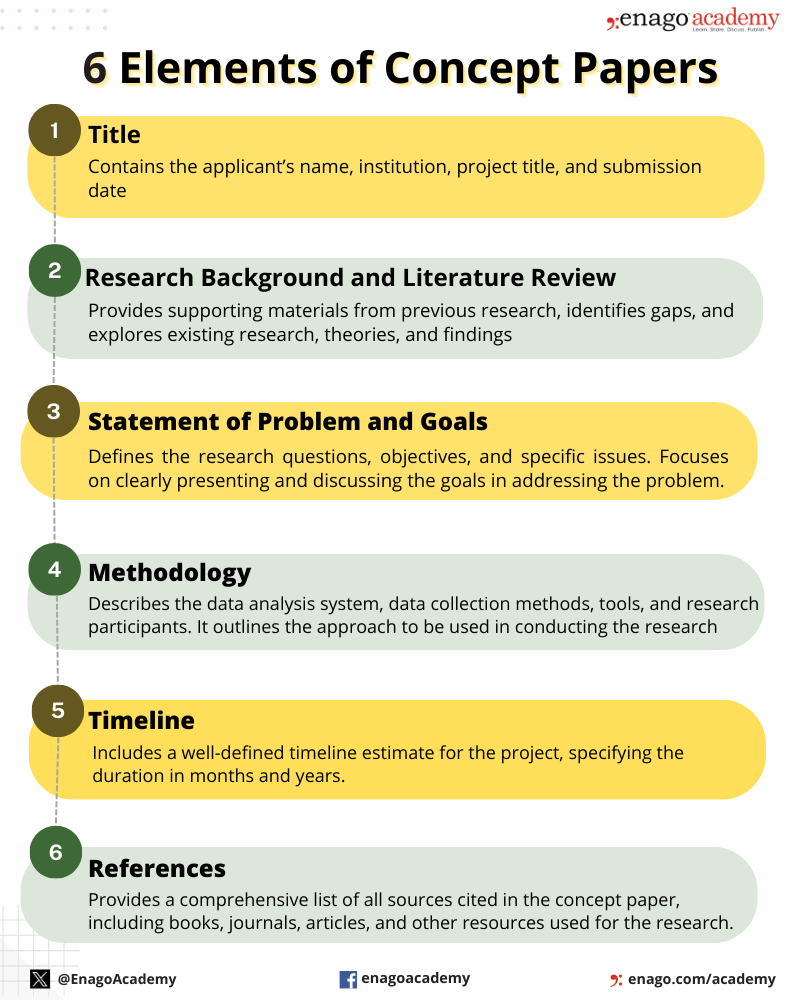
How to Write a Concept Paper?
To ensure an effective concept paper, it’s recommended to select a compelling research topic, pose numerous research questions and incorporate data and numbers to support the project’s rationale. The document must be concise (around five pages) after tailoring the content and following the formatting requirements. Additionally, infographics and scientific illustrations can enhance the document’s impact and engagement with the audience. The steps to write a concept paper are as follows:
1. Write a Crisp Title:
Choose a clear, descriptive title that encapsulates the main idea. The title should express the paper’s content. It should serve as a preview for the reader.
2. Provide a Background Information:
Give a background information about the issue or topic. Define the key terminologies or concepts. Review existing literature to identify the gaps your concept paper aims to fill.
3. Outline Contents in the Introduction:
Introduce the concept paper with a brief overview of the problem or idea you’re addressing. Explain its significance. Identify the specific knowledge gaps your research aims to address and mention any contradictory theories related to your research question.
4. Define a Mission Statement:
The mission statement follows a clear problem statement that defines the problem or concept that need to be addressed. Write a concise mission statement that engages your research purpose and explains why gaining the reader’s approval will benefit your field.
5. Explain the Research Aim and Objectives:
Explain why your research is important and the specific questions you aim to answer through your research. State the specific goals and objectives your concept intends to achieve. Provide a detailed explanation of your concept. What is it, how does it work, and what makes it unique?
6. Detail the Methodology:
Discuss the research methods you plan to use, such as surveys, experiments, case studies, interviews, and observations. Mention any ethical concerns related to your research.
7. Outline Proposed Methods and Potential Impact:
Provide detailed information on how you will conduct your research, including any specialized equipment or collaborations. Discuss the expected results or impacts of implementing the concept. Highlight the potential benefits, whether social, economic, or otherwise.
8. Mention the Feasibility
Discuss the resources necessary for the concept’s execution. Mention the expected duration of the research and specific milestones. Outline a proposed timeline for implementing the concept.
9. Include a Support Section:
Include a section that breaks down the project’s budget, explaining the overall cost and individual expenses to demonstrate how the allocated funds will be used.
10. Provide a Conclusion:
Summarize the key points and restate the importance of the concept. If necessary, include a call to action or next steps.
Although the structure and elements of a concept paper may vary depending on the specific requirements, you can tailor your document based on the guidelines or instructions you’ve been given.
Here are some tips to write a concept paper:
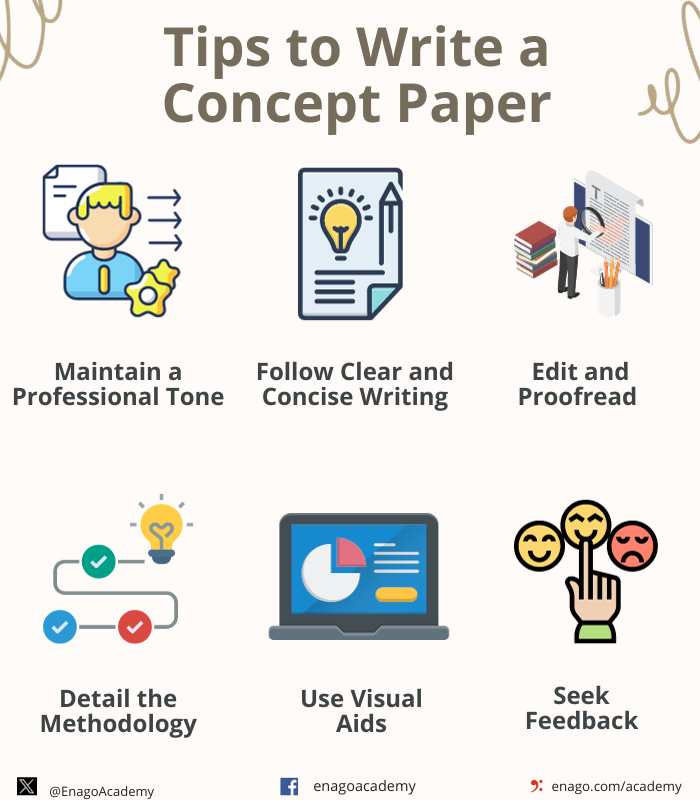
Example of a Concept Paper
Here is an example of a concept paper. Please note, this is a generalized example. Your concept paper should align with the specific requirements, guidelines, and objectives you aim to achieve in your proposal. Tailor it accordingly to the needs and context of the initiative you are proposing.
Download Now!
Importance of a Concept Paper
Concept papers serve various fields, influencing the direction and potential of research in science, social sciences, technology, and more. They contribute to the formulation of groundbreaking studies and novel ideas that can impact societal, economic, and academic spheres.
A concept paper serves several crucial purposes in various fields:
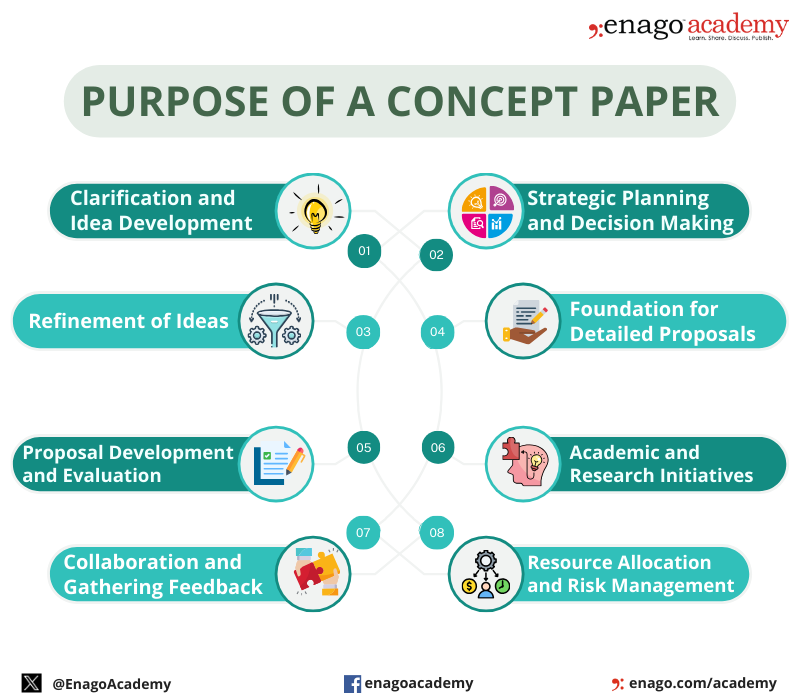
In summary, a well-crafted concept paper is essential in outlining a clear, concise, and structured framework for new ideas or proposals. It helps in assessing the feasibility, viability, and potential impact of the concept before investing significant resources into its implementation.
How well do you understand concept papers? Test your understanding now!
Fill the Details to Check Your Score

Role of AI in Writing Concept Papers
The increasing use of AI, particularly generative models, has facilitated the writing process for concept papers. Responsible use involves leveraging AI to assist in ideation, organization, and language refinement while ensuring that the originality and ethical standards of research are maintained.
AI plays a significant role in aiding the creation and development of concept papers in several ways:
1. Idea Generation and Organization
AI tools can assist in brainstorming initial ideas for concept papers based on key concepts. They can help in organizing information, creating outlines, and structuring the content effectively.
2. Summarizing Research and Data Analysis
AI-powered tools can assist in conducting comprehensive literature reviews, helping writers to gather and synthesize relevant information. AI algorithms can process and analyze vast amounts of data, providing insights and statistics to support the concept presented in the paper.
3. Language and Style Enhancement
AI grammar checker tools can help writers by offering grammar, style, and tone suggestions, ensuring professionalism. It can also facilitate translation, in case a global collaboration.
4. Collaboration and Feedback
AI platforms offer collaborative features that enable multiple authors to work simultaneously on a concept paper, allowing for real-time contributions and edits.
5. Customization and Personalization
AI algorithms can provide personalized recommendations based on the specific requirements or context of the concept paper. They can assist in tailoring the concept paper according to the target audience or specific guidelines.
6. Automation and Efficiency
AI can automate certain tasks, such as citation formatting, bibliography creation, or reference checking, saving time for the writer.
7. Analytics and Prediction
AI models can predict potential outcomes or impacts based on the information provided, helping writers anticipate the possible consequences of the proposed concept.
8. Real-Time Assistance
AI-driven chat-bots can provide real-time support and answers to specific questions related to the concept paper writing process.
AI’s role in writing concept papers significantly streamlines the writing process, enhances the quality of the content, and provides valuable assistance in various stages of development, contributing to the overall effectiveness of the final document.
Concept papers serve as the stepping stone in the research journey, aiding in the crystallization of ideas and the formulation of robust research proposals. It the cornerstone for translating ideas into impactful realities. Their significance spans diverse domains, from academia to business, enabling stakeholders to evaluate, invest, and realize the potential of groundbreaking concepts.
Frequently Asked Questions
A concept paper can be defined as a concise document outlining the fundamental aspects of a grant proposal such as the initial ideas, objectives, and theoretical framework of a proposed research project.
A good concept paper should offer a clear and comprehensive overview of the proposed research. It should demonstrate a strong understanding of the subject matter and outline a structured plan for its execution.
Concept paper is important to develop and clarify ideas, develop and evaluate proposal, inviting collaboration and collecting feedback, presenting proposals for academic and research initiatives and allocating resources.
I got wonderful idea
It helps a lot for my concept paper.
Information is key to the guidelines of a concept paper
Rate this article Cancel Reply
Your email address will not be published.

Enago Academy's Most Popular Articles

- Old Webinars
- Trending Now
- Webinar Mobile App
Mastering Research Funding: A step-by-step guide to finding and winning grants
Identifying relevant funding opportunities Importance of eligibility criteria Understanding the funder’s perspective Crafting a strong…

- Career Corner
Academic Webinars: Transforming knowledge dissemination in the digital age
Digitization has transformed several areas of our lives, including the teaching and learning process. During…

- Manuscripts & Grants
- Reporting Research
Mastering Research Grant Writing in 2024: Navigating new policies and funder demands
Entering the world of grants and government funding can leave you confused; especially when trying…

How to Create a Poster That Stands Out: Tips for a smooth poster presentation
It was the conference season. Judy was excited to present her first poster! She had…

Academic Essay Writing Made Simple: 4 types and tips
The pen is mightier than the sword, they say, and nowhere is this more evident…

Sign-up to read more
Subscribe for free to get unrestricted access to all our resources on research writing and academic publishing including:
- 2000+ blog articles
- 50+ Webinars
- 10+ Expert podcasts
- 50+ Infographics
- 10+ Checklists
- Research Guides
We hate spam too. We promise to protect your privacy and never spam you.
- Industry News
- Publishing Research
- AI in Academia
- Promoting Research
- Diversity and Inclusion
- Infographics
- Expert Video Library
- Other Resources
- Enago Learn
- Upcoming & On-Demand Webinars
- Open Access Week 2024
- Peer Review Week 2024
- Publication Integrity Week 2024
- Conference Videos
- Enago Report
- Journal Finder
- Enago Plagiarism & AI Grammar Check
- Editing Services
- Publication Support Services
- Research Impact
- Translation Services
- Publication solutions
- AI-Based Solutions
- Thought Leadership
- Call for Articles
- Call for Speakers
- Author Training
- Edit Profile
I am looking for Editing/ Proofreading services for my manuscript Tentative date of next journal submission:

Which among these would you prefer the most for improving research integrity?
How To Write a Concept Paper for Academic Research: An Ultimate Guide

A concept paper is one of the first steps in helping you fully realize your research project. Because of this, some schools opt to teach students how to write concept papers as early as high school. In college, professors sometimes require their students to submit concept papers before suggesting their research projects to serve as the foundations for their theses.
If you’re reading this right now, you’ve probably been assigned by your teacher or professor to write a concept paper. To help you get started, we’ve prepared a comprehensive guide on how to write a proper concept paper.
Related: How to Write Significance of the Study (with Examples)
Table of Contents
What is the concept paper, 1. academic research concept papers, 2. advertising concept papers, 3. research grant concept papers, concept paper vs. research proposal, tips for finding your research topic, 2. think of research questions that you want to answer in your project, 3. formulate your research hypothesis, 4. plan out how you will achieve, analyze, and present your data, 2. introduction, 3. purpose of the study, 4. preliminary literature review, 5. objectives of the study, 6. research questions and hypotheses, 7. proposed methodology, 8. proposed research timeline, 9. references, sample concept paper for research proposal (pdf), tips for writing your concept paper.
Generally, a concept paper is a summary of everything related to your proposed project or topic. A concept paper indicates what the project is all about, why it’s important, and how and when you plan to conduct your project.
Different Types of the Concept Paper and Their Uses

This type of concept paper is the most common type and the one most people are familiar with. Concept papers for academic research are used by students to provide an outline for their prospective research topics.
These concept papers are used to help students flesh out all the information and ideas related to their topic so that they may arrive at a more specific research hypothesis.
Since this is the most common type of concept paper, it will be the main focus of this article.
Advertising concept papers are usually written by the creative and concept teams in advertising and marketing agencies.
Through a concept paper, the foundation or theme for an advertising campaign or strategy is formed. The concept paper can also serve as a bulletin board for ideas that the creative and concept teams can add to or develop.
This type of concept paper usually discusses who the target audience of the campaign is, what approach of the campaign will be, how the campaign will be implemented, and the projected benefits and impact of the campaign to the company’s sales, consumer base, and other aspects of the company.
This type of concept paper is most common in the academe and business world. Alongside proving why your research project should be conducted, a research grant concept paper must also appeal to the company or funding agency on why they should be granted funds.
The paper should indicate a proposed timeline and budget for the entire project. It should also be able to persuade the company or funding agency on the benefits of your research project– whether it be an increase in sales or productivity or for the benefit of the general public.
It’s important to discuss the differences between the two because a lot of people often use these terms interchangeably.
A concept paper is one of the first steps in conducting a research project. It is during this process that ideas and relevant information to the research topic are gathered to produce the research hypothesis. Thus, a concept paper should always precede the research proposal.
A research proposal is a more in-depth outline of a more fleshed-out research project. This is the final step before a researcher can conduct their research project. Although both have similar elements and structures, a research proposal is more specific when it comes to how the entire research project will be conducted.
Getting Started on Your Concept Paper
1. find a research topic you are interested in.
When choosing a research topic, make sure that it is something you are passionate about or want to learn more about. If you are writing one for school, make sure it is still relevant to the subject of your class. Choosing a topic you aren’t invested in may cause you to lose interest in your project later on, which may lower the quality of the research you’ll produce.
A research project may last for months and even years, so it’s important that you will never lose interest in your topic.
- Look for inspiration everywhere. Take a walk outside, read books, or go on your computer. Look around you and try to brainstorm ideas about everything you see. Try to remember any questions you might have asked yourself before like why something is the way it is or why can’t this be done instead of that .
- Think big. If you’re having trouble thinking up a specific topic to base your research project on, choosing a broad topic and then working your way down should help.
- Is it achievable? A lot of students make the mistake of choosing a topic that is hard to achieve in terms of materials, data, and/or funding available. Before you decide on a research topic, make sure you consider these aspects. Doing so will save you time, money, and effort later on.
- Be as specific as can be. Another common mistake that students make is that they sometimes choose a research topic that is too broad. This results in extra effort and wasted time while conducting their research project. For example: Instead of “The Effects of Bananas on Hungry Monkeys” , you could specify it to “The Effects of Cavendish Bananas on Potassium-deficiency in Hungry Philippine Long-tailed Macaques in Palawan, Philippines”.
Now that you have a general idea of the topic of your research project, you now need to formulate research questions based on your project. These questions will serve as the basis for what your project aims to answer. Like your research topic, make sure these are specific and answerable.
Following the earlier example, possible research questions could be:
- Do Cavendish bananas produce more visible effects on K-deficiency than other bananas?
- How susceptible are Philippine long-tailed macaques to K-deficiency?
- What are the effects of K-deficiency in Philippine long-tailed macaques?
After formulating the research questions, you should also provide your hypothesis for each question. A research hypothesis is a tentative answer to the research problem. You must provide educated answers to the questions based on your existing knowledge of the topic before you conduct your research project.
After conducting research and collecting all of the data into the final research paper, you will then have to approve or disprove these hypotheses based on the outcome of the project.
Prepare a plan on how to acquire the data you will need for your research project. Take note of the different types of analysis you will need to perform on your data to get the desired results. Determine the nature of the relationship between different variables in your research.
Also, make sure that you are able to present your data in a clear and readable manner for those who will read your concept paper. You can achieve this by using tables, charts, graphs, and other visual aids.
Related: How to Make Conceptual Framework (with Examples and Templates)
Generalized Structure of a Concept Paper
Since concept papers are just summaries of your research project, they are usually short and no longer than 5 pages. However, for big research projects, concept papers can reach up to more than 20 pages.
Your teacher or professor may give you a certain format for your concept papers. Generally, most concept papers are double-spaced and are less than 500 words in length.
Even though there are different types of concept papers, we’ve provided you with a generalized structure that contains elements that can be found in any type of concept paper.
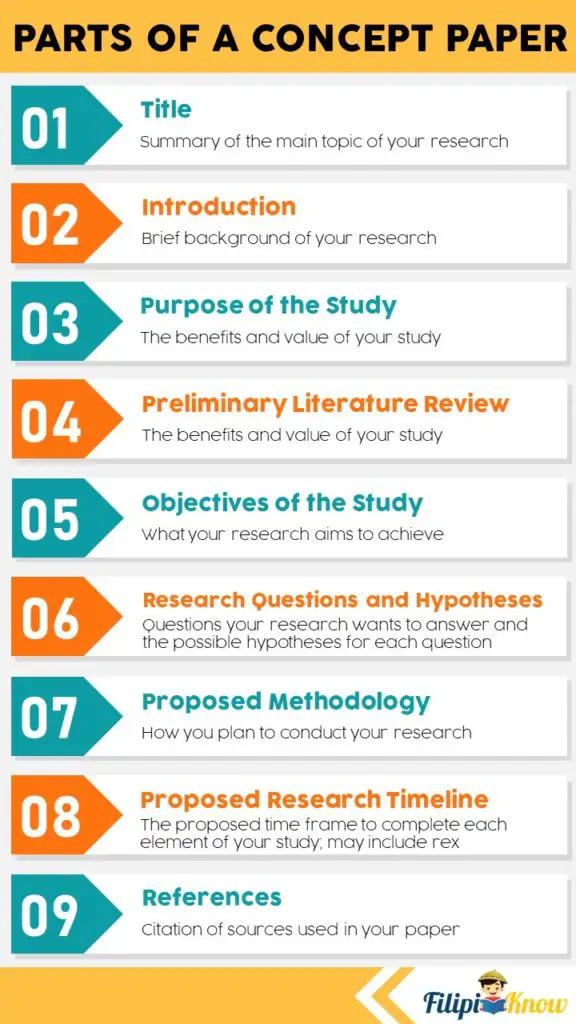
The title for your paper must be able to effectively summarize what your research is all about. Use simple words so that people who read the title of your research will know what it’s all about even without reading the entire paper.
The introduction should give the reader a brief background of the research topic and state the main objective that your project aims to achieve. This section should also include a short overview of the benefits of the research project to persuade the reader to acknowledge the need for the project.
The Purpose of the Study should be written in a way that convinces the reader of the need to address the existing problem or gap in knowledge that the research project aims to resolve. In this section, you have to go into more detail about the benefits and value of your project for the target audience/s.
This section features related studies and papers that will support your research topic. Use this section to analyze the results and methodologies of previous studies and address any gaps in knowledge or questions that your research project aims to answer. You may also use the data to assert the importance of conducting your research.
When choosing which papers and studies you should include in the Preliminary Literature Review, make sure to choose relevant and reliable sources. Reliable sources include academic journals, credible news outlets, government websites, and others. Also, take note of the authors for the papers as you will need to cite them in the References section.
Simply state the main objectives that your research is trying to achieve. The objectives should be able to indicate the direction of the study for both the reader and the researcher. As with other elements in the paper, the objectives should be specific and clearly defined.
Gather the research questions and equivalent research hypotheses you formulated in the earlier step and list them down in this section.
In this section, you should be able to guide the reader through the process of how you will conduct the research project. Make sure to state the purpose for each step of the process, as well as the type of data to be collected and the target population.
Depending on the nature of your research project, the length of the entire process can vary significantly. What’s important is that you are able to provide a reasonable and achievable timeline for your project.
Make sure the time you will allot for each component of your research won’t be too excessive or too insufficient so that the quality of your research won’t suffer.
Ensure that you will give credit to all the authors of the sources you used in your paper. Depending on your area of study or the instructions of your professor, you may need to use a certain style of citation.
There are three main citation styles: the American Psychological Association (APA), Modern Language Association (MLA), and the Chicago style.
The APA style is mostly used for papers related to education, psychology, and the sciences. The APA citation style usually follows this format:
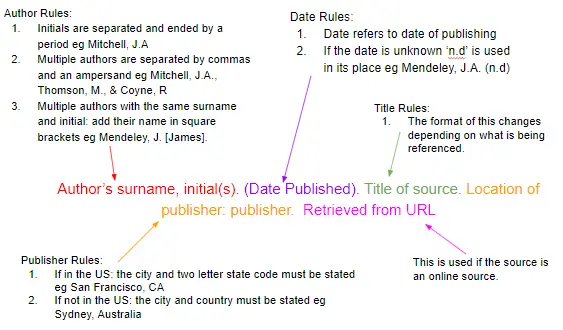
The MLA citation style is the format used by papers and manuscripts in disciplines related to the arts and humanities. The MLA citation style follows this format:
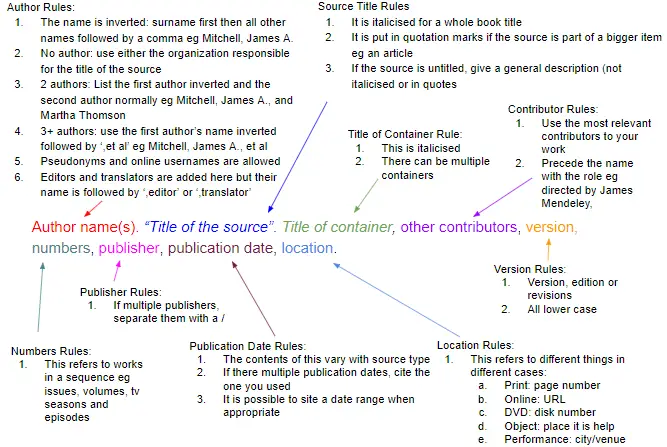
The Chicago citation style is usually used for papers related to business, history, and the fine arts. It follows this citation format:

This is a concept paper sample provided by Dr. Bernard Lango from the Jomo Kenyatta University of Agriculture and Technology (modified for use in this article). Simply click the link above the download the PDF file.
- Use simple, concise language. Minimize the use of flowery language and always try to use simple and easy-to-understand language. Too many technical or difficult words in your paper may alienate your readers and make your paper hard to read.
- Choose your sources wisely. When scouring the Internet for sources to use, you should always be wary and double-check the authenticity of your source. Doing this will increase the authenticity of your research project’s claims and ensure better data gathered during the process.
- Follow the specified format, if any. Make sure to follow any specified format when writing your concept paper. This is very important, especially if you’re writing your concept paper for class. Failure to follow the format will usually result in point deductions and delays because of multiple revisions needed.
- Proofread often. Make it a point to reread different sections of your concept paper after you write them. Another way you can do this is by taking a break for a few days and then coming back to proofread your writing. You may notice certain areas you’d like to revise or mistakes you’d like to fix. Make proofreading a habit to increase the quality of your paper.
Written by Ruth Raganit
in Career and Education , Juander How
Ruth Raganit
Ruth Raganit obtained her Bachelor of Science degree in Geology from the University of the Philippines – Diliman. Her love affair with Earth sciences began when she saw a pretty rock and wondered how it came to be. She also likes playing video games, doing digital art, and reading manga.
Browse all articles written by Ruth Raganit
Copyright Notice
All materials contained on this site are protected by the Republic of the Philippines copyright law and may not be reproduced, distributed, transmitted, displayed, published, or broadcast without the prior written permission of filipiknow.net or in the case of third party materials, the owner of that content. You may not alter or remove any trademark, copyright, or other notice from copies of the content. Be warned that we have already reported and helped terminate several websites and YouTube channels for blatantly stealing our content. If you wish to use filipiknow.net content for commercial purposes, such as for content syndication, etc., please contact us at legal(at)filipiknow(dot)net


Concept Paper: Definition, Parts, Format & How-To Guide
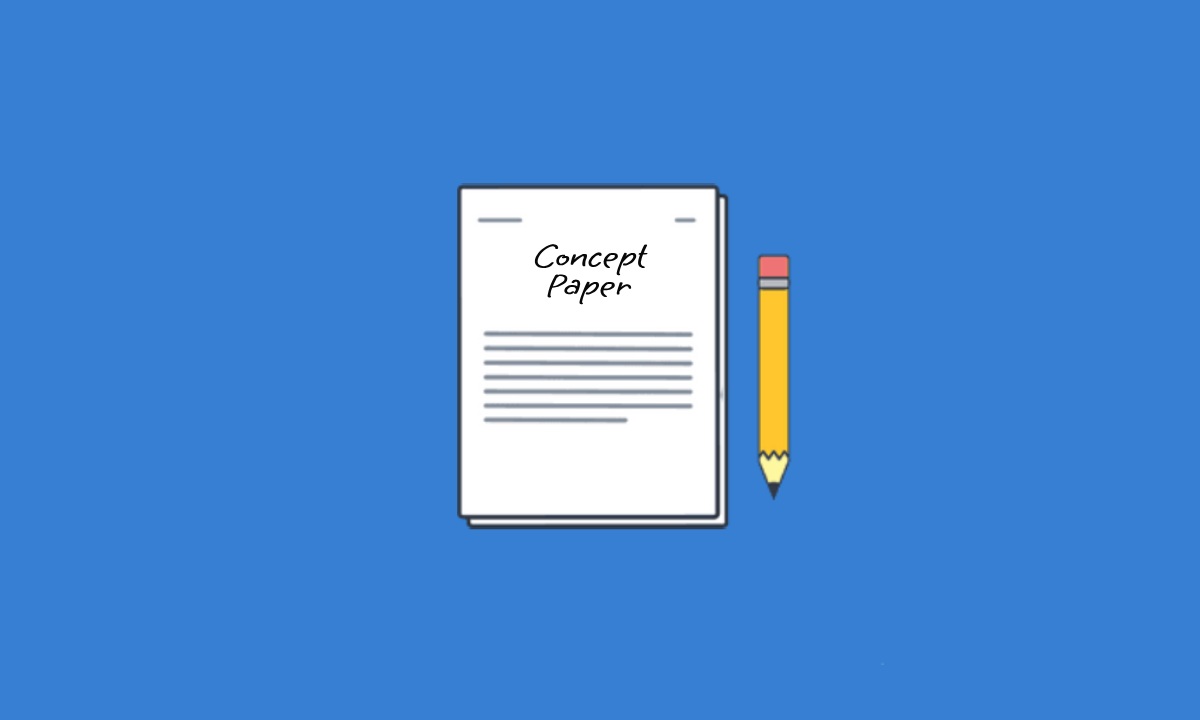
What is a Concept Paper?
A concept paper is a concise document that outlines a proposed research project or study. It serves as a preliminary plan, presenting the research problem, objectives, significance, and proposed methodology. The purpose of a concept paper is to communicate the central idea of the research to advisors, committees, or funding bodies for feedback or approval before proceeding with a full proposal or detailed research plan. It helps clarify the research direction and ensures that the study aligns with academic or institutional guidelines.
Table of Contents
Concept Paper Parts:
A concept paper in academic writing typically consists of the following key parts:
Title: A clear, concise title that reflects the focus of the research or project.
Introduction: Provides background information on the topic and highlights the significance of the research. It should introduce the problem or issue being addressed.
Problem Statement: Clearly defines the specific problem or gap in knowledge that the research seeks to address.
Objectives: Outlines the main goals or aims of the research, specifying what the study intends to accomplish.
Research Questions or Hypothesis: Presents the specific questions the research will answer or the hypothesis to be tested.
Methodology: Describes the research design, data collection methods, and analysis techniques to be used in the study.
Significance: Explains the importance of the research, highlighting its potential contribution to the field, academia, or society.
Literature Review (optional): Briefly summarizes existing studies or theories related to the research topic, demonstrating the gap the study will fill.
Budget and Timeline (optional): If applicable, includes a rough estimate of the costs and a timeline for completing the research.
These parts ensure the concept paper effectively communicates the core idea and plan for the research to relevant stakeholders.
Concept Paper Format:
The format of a concept paper can vary depending on the institution, funding body, or field of study, but it generally adheres to a standard structure. Below is a commonly used format for a concept paper in academic writing:
1. Title Page
- Project or Research Title
- Author’s Name and Affiliation
- Contact Information (if required)
2. Introduction
- Background of the study
- Brief context to the topic
- Importance or relevance of the topic
3. Problem Statement
- Clearly define the issue, problem, or gap in knowledge.
- Provide context, scope, and relevance of the problem.
4. Objectives
- State the overall aim and specific objectives of the study.
- Use bullet points for clarity (e.g., “To examine…”, “To identify…”, “To analyze…”).
5. Research Questions or Hypothesis
- List the primary research questions or hypotheses that the study will address.
6. Literature Review (Optional)
- Briefly summarize key studies related to your topic.
- Identify research gaps or areas of controversy.
7. Methodology
- Describe the research design (qualitative, quantitative, or mixed-methods).
- Specify the methods of data collection (e.g., surveys, interviews, experiments).
- Define the target population or sample and the sampling techniques.
- Outline the data analysis techniques.
8. Significance of the Study
- Explain the potential contribution to theory, practice, or policy.
- Highlight how the research will address the problem or gap.
9. Proposed Budget and Timeline (Optional)
- Present a rough estimate of the costs involved (if applicable).
- Provide a tentative timeline for completing the study.
10. References
- Include a list of academic references cited in the concept paper.
Formatting Tips:
- Length: Typically between 2-5 pages, depending on requirements.
- Font and Spacing: Use a standard font like Times New Roman, size 12, with 1-inch margins and 1.5 or double spacing.
- Headings and Subheadings: Use clear headings for each section to enhance readability.
This structured format ensures clarity and allows reviewers to quickly grasp the purpose and approach of the proposed research.
How to Write a Concept Paper?
Writing a concept paper involves presenting the core idea of your research or project in a concise and clear manner. Here’s a step-by-step guide on how to write an effective concept paper:
1. Select a Research Topic
The first step in writing a concept paper is selecting a relevant research topic. This should be a subject that aligns with your field of study or area of interest. Ensure that the topic addresses a specific problem, gap, or need in the existing literature or community. Choosing a well-defined topic will help you develop a focused and purposeful concept paper.
2. Conduct Preliminary Research
Before drafting your concept paper, conduct preliminary research on the topic to gather background information. Review existing literature to understand the scope of the issue and identify gaps that your research can fill. This initial research will help you frame the problem and justify the need for your study, ensuring that your proposal is grounded in existing knowledge.
3. Title Your Concept Paper
The title of your concept paper should clearly and succinctly reflect the focus of your research. A well-crafted title provides readers with a snapshot of the topic. It should be informative and engaging, giving a concise overview of the study while piquing the interest of stakeholders or reviewers.
4. Write the Introduction
In the introduction, provide a brief overview of the background and context of your research topic. Explain why the research is significant and relevant to the field or society. End the introduction by presenting the core issue or problem that your research will address. The goal is to establish the importance of your study and to capture the reader’s attention by highlighting the relevance of the problem.
5. Formulate the Problem Statement
The problem statement is one of the most critical sections of a concept paper. It should clearly define the specific problem, issue, or gap in knowledge that your research aims to address. Use precise language to articulate why this problem needs attention, and explain its significance in both practical and academic terms. The problem statement should be compelling and clearly establish the need for your research.
6. State the Objectives
After identifying the problem, state the main objectives of your research. These objectives should directly relate to solving or investigating the problem you’ve outlined. Break them down into specific, measurable goals, such as “to examine the impact of X” or “to analyze the relationship between Y and Z.” Well-defined objectives ensure that your research has a clear direction and purpose.
7. Develop Research Questions or Hypotheses
Next, present the research questions your study will answer, or the hypotheses you will test. These questions or hypotheses should align with your objectives and provide a framework for your research. Research questions help guide your inquiry, while hypotheses give you a starting point for testing assumptions. These elements ensure that your study has a focused approach.
8. Outline the Methodology
In the methodology section, describe the approach you will take to conduct the research. This includes the research design (whether qualitative, quantitative, or mixed methods), data collection techniques, and the population or sample you will study. Explain how you will collect and analyze the data, and justify why these methods are appropriate for answering your research questions. A clear methodology helps reviewers understand how you plan to execute the study.
9. Explain the Significance
The significance section explains why your research matters. Highlight the potential contributions your study will make to the field, theory, or practice. Discuss how the results could address the problem you’ve identified and potentially inform policy, improve practices, or advance academic knowledge. A strong explanation of significance can make your concept paper more persuasive to stakeholders and funders.
10. Include a Budget and Timeline (Optional)
If required, include a budget and timeline. The budget should offer a rough estimate of the financial resources needed to complete the research. The timeline provides an outline of the major milestones of the study and the estimated time for each phase, from data collection to final analysis. Both elements demonstrate your preparedness and planning for the research project.
11. Cite References (If Applicable)
If you’ve drawn upon any academic literature or sources to support your concept paper, include a references section. Use the appropriate citation style , such as APA, MLA, or Chicago, to format your references correctly. Citing references ensures academic integrity and supports the credibility of your concept paper by showing that your proposal is built on established research.
12. Revise and Proofread
Finally, revise and proofread your concept paper for clarity, coherence, and conciseness. Ensure that each section flows logically from one to the next and that your paper effectively communicates your research proposal. Check for grammatical, spelling, and formatting errors to ensure your paper is polished and professional.
Concept Paper Topic Ideas:
Below are some topic ideas for a concept paper across various academic fields:
1. Education
- The Impact of Remote Learning on Student Engagement and Academic Performance.
- Exploring the Effectiveness of Interactive Technology in Enhancing Classroom Learning.
- Addressing the Learning Gap: Strategies for Supporting Struggling Students Post-Pandemic.
- The Role of Emotional Intelligence in Teacher-Student Relationships and Academic Outcomes.
2. Health Sciences
- The Role of Telemedicine in Improving Healthcare Access in Rural Areas.
- Investigating the Impact of Mental Health Awareness Campaigns on College Students.
- The Effectiveness of Plant-Based Diets in Reducing Cardiovascular Disease Risk.
- Exploring the Link Between Social Media Use and Body Image Disorders in Adolescents.
3. Environmental Studies
- The Impact of Urbanization on Local Biodiversity: A Case Study of [Region].
- Renewable Energy Adoption: Challenges and Opportunities in Developing Countries.
- Reducing Plastic Waste: Exploring Effective Strategies for Sustainable Packaging.
- The Role of Green Infrastructure in Mitigating Urban Flooding.
4. Business and Economics
- The Impact of E-commerce on Small Businesses During Economic Downturns.
- Exploring the Role of Corporate Social Responsibility in Brand Loyalty.
- The Influence of Remote Work on Organizational Culture and Employee Productivity.
- Cryptocurrency: Evaluating Its Potential for Mainstream Economic Systems.
5. Social Sciences
- The Role of Social Media in Shaping Political Opinions Among Young Adults.
- Exploring the Impact of Gender Stereotypes on Career Choices in STEM Fields.
- Investigating the Effects of Income Inequality on Crime Rates in Urban Areas.
- The Influence of Cultural Identity on Immigrant Adaptation in [Country].
6. Technology
- The Role of Artificial Intelligence in Transforming the Healthcare Industry.
- The Ethical Implications of Data Privacy in an Age of Big Data.
- Blockchain Technology: Potential Applications Beyond Cryptocurrency.
- Exploring the Impact of Automation on the Global Job Market.
7. Humanities
- The Influence of Digital Media on Traditional Art Forms.
- Examining the Representation of Mental Health in Contemporary Literature.
- The Role of Language in Shaping National Identity and Cultural Heritage.
- Exploring the Impact of Historical Trauma on Collective Memory in [Country/Region].
Concept Paper Example:
Below is a brief example of a concept paper based on a hypothetical research topic:
The Role of Urban Gardens in Promoting Food Security and Community Well-being
Introduction:
Urban gardens have emerged as a popular solution to enhance food security and foster community well-being in cities around the world. With urbanization on the rise and many communities facing limited access to fresh, affordable produce, urban gardening initiatives offer a sustainable solution. These gardens not only provide food but also create green spaces that improve mental health, build social connections, and promote environmental awareness. Despite the potential benefits, there is a need for further research to quantify the direct impact of urban gardens on local food security and community well-being. This study aims to examine how urban gardens contribute to food security in low-income neighborhoods and assess their broader social and environmental impacts.
Problem Statement:
In many urban areas, particularly in low-income neighborhoods, residents face limited access to fresh, healthy food, leading to food insecurity and related health issues. Urban gardens have been proposed as a community-based solution, but there is insufficient data on their effectiveness in alleviating food insecurity and their overall impact on community well-being. This study seeks to address this gap by examining the specific contributions of urban gardens to improving food access, mental health, and community resilience in low-income urban areas.
Objectives:
The primary objective of this research is to evaluate the role of urban gardens in promoting food security and enhancing the well-being of urban communities. Specifically, the study will:
- Assess how urban gardens increase access to fresh food in low-income areas.
- Analyze the impact of urban gardens on community cohesion and mental health.
- Explore the environmental benefits of urban gardens, such as reducing urban heat islands and increasing biodiversity.
Research Questions:
How do urban gardens improve food security in low-income urban neighborhoods? What is the impact of participation in urban gardening on the mental health and well-being of community members? What environmental benefits do urban gardens provide to urban ecosystems?
Methodology:
This study will use a mixed-methods approach to explore the role of urban gardens. The quantitative aspect will involve surveys and data collection from households participating in urban garden initiatives in three low-income neighborhoods. The data will measure changes in food security, mental health, and community engagement. In addition, qualitative interviews will be conducted with garden organizers and participants to gather in-depth perspectives on the social and environmental impacts of these gardens. Satellite imagery and environmental assessments will also be used to analyze changes in green space and biodiversity associated with urban gardening projects.
Significance:
This research will contribute to the understanding of how urban gardening can serve as a practical tool for improving food security and community well-being in urban areas. The findings could inform policy decisions on urban planning, food systems, and public health, particularly in cities facing issues of food deserts and environmental degradation. By providing evidence on the benefits of urban gardens, this study will support the expansion of urban gardening initiatives as a sustainable, community-driven solution to urban challenges.
Budget and Timeline (Optional):
The proposed research will be conducted over a period of 12 months, with an estimated budget of $10,000. This budget includes costs for survey administration, travel to garden sites, and environmental assessment tools. Major milestones include the completion of data collection within the first 6 months and the publication of findings by the end of the project timeline.
Related Posts

How to Write a Friendship Letter
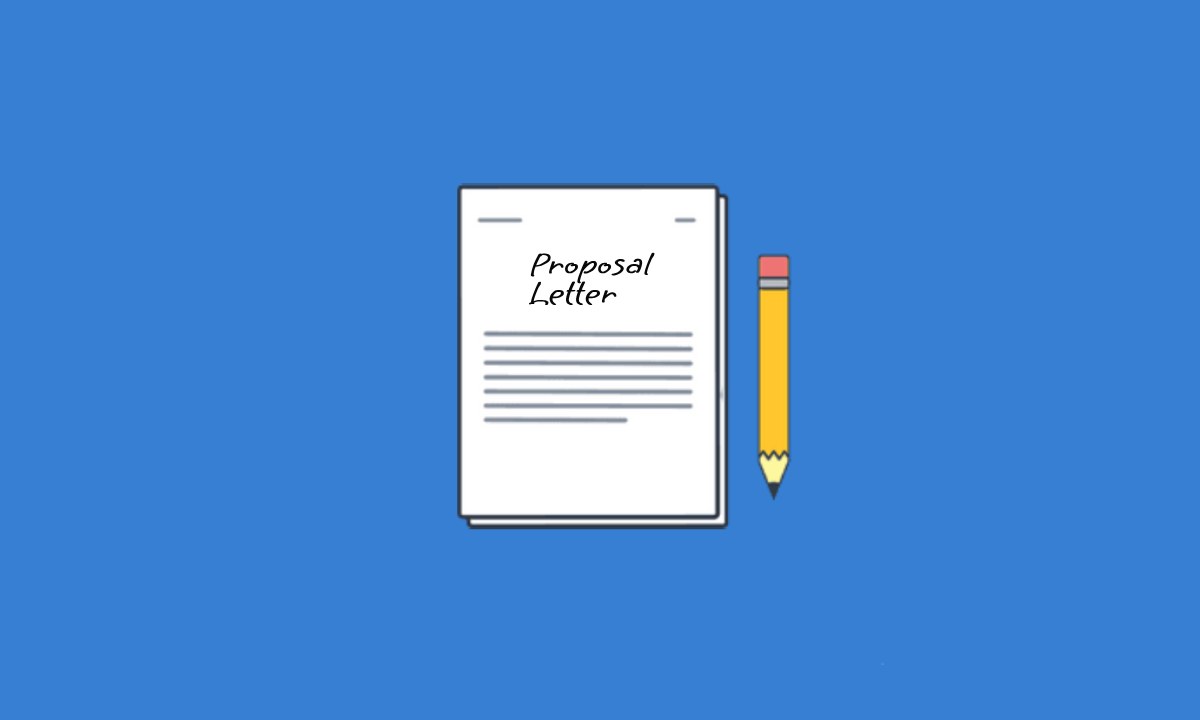
How to Write Proposal Letter to Offer Services

How to Write a Thank You Letter

IMAGES
VIDEO
COMMENTS
Additionally, infographics and scientific illustrations can enhance the document's impact and engagement with the audience. The steps to write a concept paper are as follows: 1. Write a Crisp Title: Choose a clear, descriptive title that encapsulates the main idea. The title should express the paper's content.
follow these steps: 1. Concept paper title. Every pa per must have a title and concept paper is not left out as one needs to have a title that. summarizes what the paper is about. The title should ...
The first question asks for a ready-made solution, and is not focused or researchable. The second question is a clearer comparative question, but note that it may not be practically feasible. For a smaller research project or thesis, it could be narrowed down further to focus on the effectiveness of drunk driving laws in just one or two countries.
Concept Paper vs. Research Proposal. Getting Started on Your Concept Paper. 1. Find a research topic you are interested in. Tips for finding your research topic. 2. Think of research questions that you want to answer in your project. 3. Formulate your research hypothesis.
The Research Concept Paper is completed prior to the dissertation proposal and serves as a development tool and summary of the planned dissertation. The Concept paper is a brief document. Depending upon the requirements of the specific school or academic program, the Concept Paper may range from as few as 2-3 pages to as many as 10-20 pages.
A concept paper is a concise document that outlines a proposed research project or study. It serves as a preliminary plan, presenting the research problem, objectives, significance, and proposed methodology. The purpose of a concept paper is to communicate the central idea of the research to advisors, committees, or funding.
Write to your audience. A concept paper is a piece of academic writing, so use a professional tone. Avoid colloquialisms, slang, and other conversational language. Your concept paper should use the same tone and style as your accompanying research paper. Write according to your reader's familiarity with the subject of your concept paper.
A pre-proposal or white paper is. a concise, authoritative document that presents a summary of the proposed research, methodology, team, and an estimated budget. Unlike proposals, which include more extensive information, white papers offer a brief overview of. a research project in a way that explores why it would be important to a funder.
A good research question is essential to guide your research paper, dissertation, or thesis. All research questions should be: Focused on a single problem or issue. Researchable using primary and/or secondary sources. Feasible to answer within the timeframe and practical constraints. Specific enough to answer thoroughly.
the answer the questions in the order shown here. Some concept papers begin with an introductory statement which provides a general statement as to what you are trying to accomplish. (This statement is distinct from the more specific research or project objective, included later.) A common format includes these headings: Need,